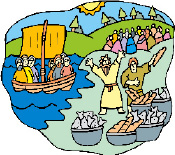

 As atheists have become more
aggressive in their attacks on the Bible and on Christianity, they make
public statements which are designed to denigrate God and the Bible.
However, many of those statements show a lack of understanding of the
difference between the New Testament and the Old Testament. An
increasing number of atheist Web sites have taken to portraying God as
a control freak, as violent, as an egomaniac, and as sexist. We have
discussed Richard Dawkins' diatribe against God in the May/June
2007 and July/August
2007 issues of this periodical. Dawkins statements are the source
of most of the atheist periodicals and Web sites that portray God this
way to the public and especially to young people. When attempts are
made to get these authors to have a better understanding of what was
written in the Bible and why, the response is usually that God must
then be a vacillating, insecure being who keeps changing the rules of
the game.
As atheists have become more
aggressive in their attacks on the Bible and on Christianity, they make
public statements which are designed to denigrate God and the Bible.
However, many of those statements show a lack of understanding of the
difference between the New Testament and the Old Testament. An
increasing number of atheist Web sites have taken to portraying God as
a control freak, as violent, as an egomaniac, and as sexist. We have
discussed Richard Dawkins' diatribe against God in the May/June
2007 and July/August
2007 issues of this periodical. Dawkins statements are the source
of most of the atheist periodicals and Web sites that portray God this
way to the public and especially to young people. When attempts are
made to get these authors to have a better understanding of what was
written in the Bible and why, the response is usually that God must
then be a vacillating, insecure being who keeps changing the rules of
the game.The fact of the matter is that there are good reasons for us to have a New Testament and an Old Testament. Failure to understand these reasons leads to misunderstandings and misapplications of what God wants us to know and do. In this article we will attempt to explain why we have a New Testament and an Old Testament and how that information should be applied.
One fact which atheists and Christians alike sometimes overlook is
that man has evolved socially and culturally since his creation. Adam
and Eve were not twenty-first century Americans driving fancy cars,
shopping in massive food stores, and spending large amounts of money,
time, and energy on entertainment. There might be differences of
opinion about how man has changed physically over time, but man's
social and cultural evolution is a fact. In Genesis 1
Adam and Eve ate by gathering. Their responsibilities included taking
care of the garden, "to dress and keep it" (Genesis 2:15).
When man no  longer lived in this state because
of sin, he was faced with a hostile world. The statement from God was
". all thy life you shalt win food from it with toil" (3:17, Knox
translation). No scientist who has studied the evidence questions this.
Atheists may challenge the cause or method, but life was hard early in
man's history. The Bible tells us that various social and cultural
advances came about. Genesis 4:21 (NIV) says that one of Adam's descendants
"was the father of all who play the harp and the flute" indicating the
development of musical instruments and obviously the culture that goes
with that skill. Genesis 4:22 (Jerusalem Bible) says, another
descendant "was the ancestor of all metal workers in copper and iron"
indicating that metallurgy eventually came into use.
longer lived in this state because
of sin, he was faced with a hostile world. The statement from God was
". all thy life you shalt win food from it with toil" (3:17, Knox
translation). No scientist who has studied the evidence questions this.
Atheists may challenge the cause or method, but life was hard early in
man's history. The Bible tells us that various social and cultural
advances came about. Genesis 4:21 (NIV) says that one of Adam's descendants
"was the father of all who play the harp and the flute" indicating the
development of musical instruments and obviously the culture that goes
with that skill. Genesis 4:22 (Jerusalem Bible) says, another
descendant "was the ancestor of all metal workers in copper and iron"
indicating that metallurgy eventually came into use.
As man progressed, a need for a justice system came about. It was
early in man's history when the first murder occurred, and the
punishment for that horrendous act was a restrained but final
punishment (see Genesis 4:11-12). As we read through the Old Testament
we see mankind moving from family units with leadership coming from a
family patriarch to a community made up of several families, and a
judicial system evolving from that community. The book of Judges has a
variety of stories showing the struggles to establish a workable
community framework. Leaders in these communities were religious
leaders who were not well informed themselves, but who struggled to do
the best they could. Judges 18 shows people competing for these leaders and
paying th em for their services.
em for their services.
What kind of system of law and order was needed in such a primitive society? As mankind battled to survive in a hostile world, what rules needed to be accepted by all who lived in close proximity to each other? Dietary laws were needed for hygienic reasons. Laws involving burying waste were needed (see Deuteronomy 23:12-14). Marriage laws were needed to protect women because they were especially vulnerable in such primitive and harsh conditions. God's method was to provide direct commandments which met these needs. Originally there was no human calling the shots and no political hierarchy making arbitrary decisions. When mankind insisted on corrupting this system, God warned them they were making a mistake (see 1 Samuel 8:5-19) but gave in to their demands.
"An eye for an eye and a tooth for a tooth" is an unattractive philosophy for those of us who have lived in a system that emphasizes tolerance and forgiveness. In primitive conditions and in a society where the daily battle for survival was extreme, it was an absolute necessity. Not eating certain animals, quarantines of certain diseases, and isolation of body fluids is medically sound. Complete isolation from peoples practicing sexual activities that spread sexually transmitted diseases is not an arbitrary edict from an egomaniac who wants to persecute. It is a necessary action to prevent diseases like the AIDS epidemic we see sweeping primitive societies in the world today. We may find some of the methods that were employed distasteful and cruel, but that judgment is coming from our civilization that is not faced with the limitations of people in Old Testament times.
THE RADICAL TEACHINGS OF JESUS
By the time Jesus Christ appeared on the earth, man had changed in
a multitude of ways. No longer were people living entirely in agrarian
settings, but many of them were living in large cities. This required a
new judicial system and a different political structure. Methods of
farming and cooking had evolved so that dietary laws could be relaxed.
Medical knowledge had advanced and survival was less of a hand-to-mouth
situation. The securing of goods through trade  and
currency had changed mankind forever, and leisure
time was available for thought and study. Above all, there was writing
by which information could be transmitted from person to person and
city to city. Mankind had evolved from a primitive, survival-oriented,
legalistic system to a personalized moral system.
and
currency had changed mankind forever, and leisure
time was available for thought and study. Above all, there was writing
by which information could be transmitted from person to person and
city to city. Mankind had evolved from a primitive, survival-oriented,
legalistic system to a personalized moral system.
As you read the teachings of Jesus in Matthew 5-7, you see Him making the contrast we have just been describing. He says things like "You have heard it said ." and then He quotes something from the Old Testament. Then Jesus, God in the flesh, says, "But I say unto you ." and He gives a contrasting way of living that involves attitudes and values steeped not in legalism, but in love and kindness. He addresses murder, not just by warning about the punishment, but by telling mankind to stop hating (Matthew 5:21-24). He attacks sexual misconduct not by a legalistic physical reprisal for an offense, but by telling us to stop making sex and our sexual motives the primary way that we look at others. This is a new command of God, appropriate for the level of development that man has achieved. It is radical. It is difficult. It is destined to fail at times because of our selfishness, but it is the ultimate positive way of life for all of mankind. It has the potential to work.
 ADDRESSING
MAN'S REAL NEEDS
ADDRESSING
MAN'S REAL NEEDS
The Old Testament addressed man's most fundamental need, which was survival. The laws given and the punishment for breaking the law generally matched the potential destructive nature of the offense. Murder, sexual misconduct, and interrelationships with those who did those things had the potential to bring disaster to the entire population, so the punishment was severe. Involuntary manslaughter and stealing had lesser destructive potential but still needed to be punished, so places like the cities of refuge were provided to make the punishment as fair as possible. God even tolerated things He did not approve of (such as polygamy) and ill-advised worship practices such as in Judges 18 because it was not as destructive.
In God's new will for man the personal needs of mankind were
emphasized. No longer were people commanded to worship in a specific
location or through a priest or other religious leader. Man's need to
look to a higher power was provided in worship through the Church, but
individual prayer and obedience was the emphasis. The need to address
giving and the serving of others was the primary emphasis of the first
century Church, replacing the ritual and pageantry of the Old
Testament. So striking is this contrast that Jesus is described as
"blotting out the handwriting of  ordinances that was against us, which was contrary to
us, and took it out of the way, nailing it to his cross" (Colossians 2:14,
KJV). We are also told in Matthew 5:17-20
that this was the completion of God's plan for man. Instead of
tolerating polygamy and its denigration of women and destruction of a
real relationship for a man and a woman, we are given a plan for
marriage that brings maximum fulfillment and satisfaction. Instead of a
giving system that is essentially taxation, giving is presented as a
gift that comes from the heart and brings joy (see 2 Corinthians 9:7).
Interpersonal conflict is addressed by direct discussion and then
assisted discussion (see Matthew
18:15-17 and Colossians 3:13), and by an attitude of forgiving,
giving, and going the second mile.
ordinances that was against us, which was contrary to
us, and took it out of the way, nailing it to his cross" (Colossians 2:14,
KJV). We are also told in Matthew 5:17-20
that this was the completion of God's plan for man. Instead of
tolerating polygamy and its denigration of women and destruction of a
real relationship for a man and a woman, we are given a plan for
marriage that brings maximum fulfillment and satisfaction. Instead of a
giving system that is essentially taxation, giving is presented as a
gift that comes from the heart and brings joy (see 2 Corinthians 9:7).
Interpersonal conflict is addressed by direct discussion and then
assisted discussion (see Matthew
18:15-17 and Colossians 3:13), and by an attitude of forgiving,
giving, and going the second mile.
Sometimes our immaturity and selfishness prevents us from seeing the beauty in this new will of God for man, but as we get older and see the failures of human systems the beauty of the New Testament of God becomes more and more clear.
WATCHING FOR THE MISUNDERSTANDINGS
When we hear people talk about the violent nature of God, quoting Old Testament examples and commands to justify the claim, we need to understand the context. That was a primitive culture, survival oriented, and controlled by a set of rigidly enforced rules. When God speaks of His jealousy He is talking about His broken heart from man's acceptance of every other kind of standard to live by except His laws. When extreme punishment is prescribed for what might be a less significant problem in our day, we need to understand that in the day the punishment was given there was very little room for other options. When nationalistic rules and commands are given, we need to understand that this was a tool to help a primitive people survive, and that today God calls us to a system of all peoples of earth being equal in opportunity and access to God (see Colossians 3:11 and Galatians 3:28). In 2 Timothy 2:15 we are told to "rightly [divide] the word of truth" and at least a part of that means looking at the time in which the teaching is given and getting the right lesson from the teaching. Forcing an Old Testament law onto the love and grace teachings of God's New Testament is a major error.
Back to Contents Does God Exist?, MayJun09.